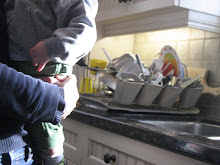It strikes me that there are a couple of separate but related issues when trying to parse the issues of motherhood and work.
One: women do two-thirds of the unpaid work that keeps our economy whisking along. Why? Why isn't the burden shared more equally?
Two: this work is not highly valued. Does that partially answer the questions above?
Now, an unacknowledged truth is that much of this unpaid work is genuinely fulfilling and meaningful. Many of us choose to do it because we love it. I love to cook. I love spending time with my children. So does it follow, then, that because we love it and because it is meaningful it shouldn't be paid?
That's where I take issue with the logic. I think women, and mothers in particular, are sold this idea that we're damned lucky to be mothers, and if we can afford to stay home, we're even luckier, that this is proof of our upper-middle-class values, and it's a luxury no one should complain about, and on and on and on. And while I agree--yes, I'm extremely fortunate to have been able to afford to stay home, and I'm privileged to be a mother--I question the reasoning that suggests that my privilege disqualifies me from addressing inequities. So, I've decided not to shut up just because I'm lucky.
Much as I love caring for my children and looking after the household duties, I would gratefully share more of these duties--and their meaningfulness and joys, as well as their burdens. It shouldn't only be those most fortunate who get to choose to stay home with their children. And really good childcare should be available and affordable for everyone. (Aside: Those two previous sentences are not in opposition to each other. Choice is the key). (Aside # 2: Somehow we seem more willing to swallow that idea if we're told it's Early Childhood Education, which is fine with me, but I wish we'd be willing to swallow the idea that good and loving childcare is valuable enough to be worth investing in).
A few modest proposals: Increase parental leave time to two years. Increase payments. Make parental leave available to everyone (I was unable to access it, being self-employed). Publicly fund a variety of childcare options, including in-home care, and preschool, daycare, and after-school programming at neighbourhood public schools, which could also house early years centres to support parents. Communities are stronger when we know each other. Families are stronger when we have a larger network of support to access.
Why is this a feminist issue? Because women do the bulk of this labour. Simple as that.
I have a piece in Senses of Cinema
6 years ago


In France, universal, public, full-time preschool starts at age three - and 98% of children attend. It's an enriching programme for kids, but children do get tired if they have to go all day. Fortunately, the three-year olds are allowed to attend half day only. For the children age 4 and up, it's all day (830 to 1630) four days per week (no school on Wednesday).
ReplyDeletep.s. I'm a friend of Wendy's. I remember meeting you when I was in university and you were about 12 years old and being homeschooled! I'm enjoying reading your blogs.
p.p.s. I would be very interested in your thoughts on feminism and childbirth. There seems to be so little out there on the subject. And why no link to Hannah Rosen's article in the Atlantic on breastfeeding (perhaps under "Make Your Blood Boil")?
Thanks for your comment, friend of Wendy! I somehow missed receiving notice of comments on this blog, and therefore have neglected to respond ... for months. I hadn't read the breastfeeding article, and really enjoyed it ... and blogged about it today. Thanks for pointing it out.
ReplyDelete